05 March 2019
Global study reveals what world thinks about women's equality
A new International Women’s Day study looks at attitudes to gender equality around the world
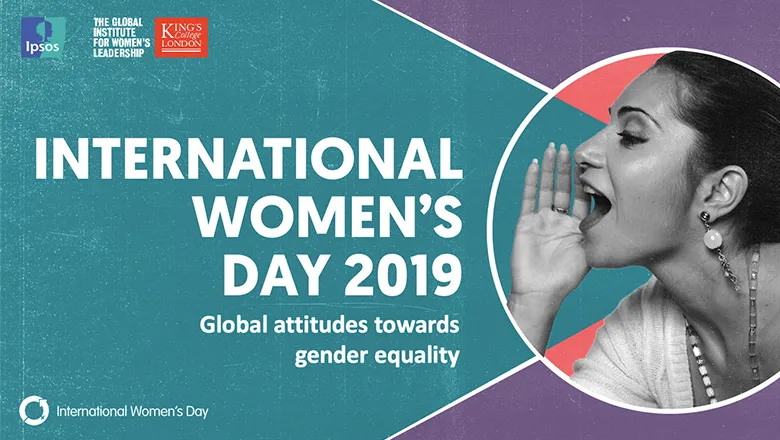
A new study by Ipsos MORI, in collaboration with the Global Institute for Women’s Leadership at King’s College London and International Women’s Day (IWD), reveals attitudes to gender equality around the world.
With this year’s IWD theme of #BalanceforBetter emphasising collective action and shared responsibility for creating a gender-balanced world, the study finds that three in five men (61%) globally acknowledge that gender equality won't be achieved in their country unless they also take action to support women’s rights.
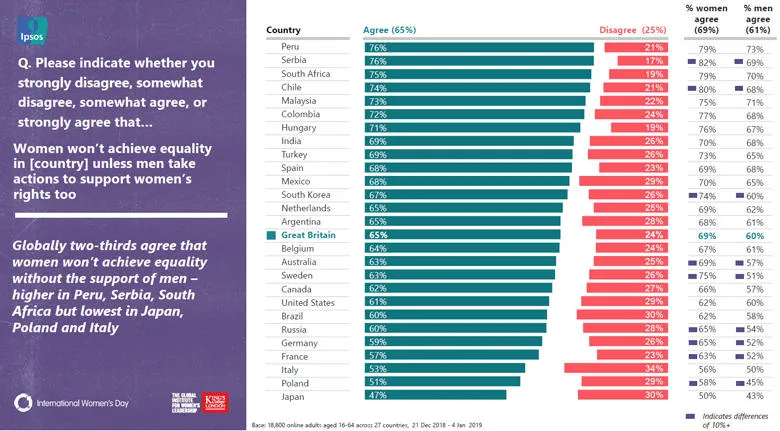
Men's role in the fight for equality
Overall, 43% think that men are being expected to do too much to support women’s equality in their country, compared with 46% who do not.
Half of all men (50%) agree that too much is expected of them to support women's equality, while a third (36%) of women do. Agreement is highest in many Latin American and Asian countries (Colombia and Mexico at 61% Peru 62%, and Malaysia and India 60%).
Those men least likely to agree are in France (21%), Belgium (22%) and Netherlands (24%).
While almost a third in Great Britain think that too much is being expected of men to support women's equality (29%), the majority (57%) do not.
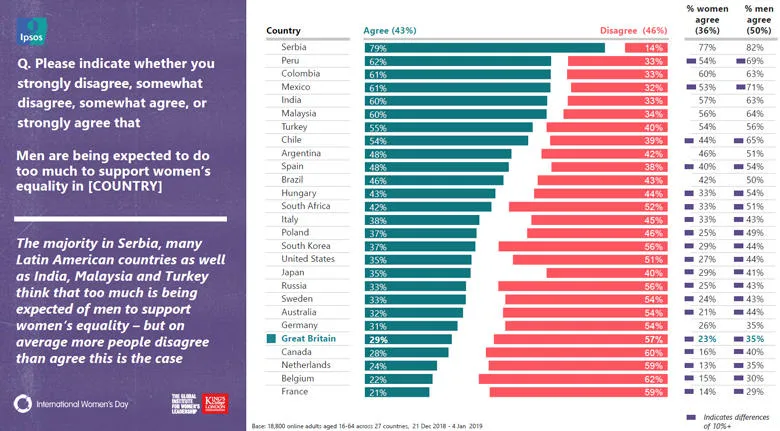
Opinions are divided on whether the push for gender equality gone far enough
More people disagree (49%) than agree (42%) that efforts to achieve women's equality have gone far enough, up four percentage points from 2018 (45%).
The British and the Japanese lead the charge in thinking more needs to be done (both 59%), followed by Australians (57%). While people in Spain (62%), Peru (60%) and India (59%) are mostly likely to think things have gone too far.
Overall, men are more likely to say equality efforts have gone far enough (46%) compared to women (37%).
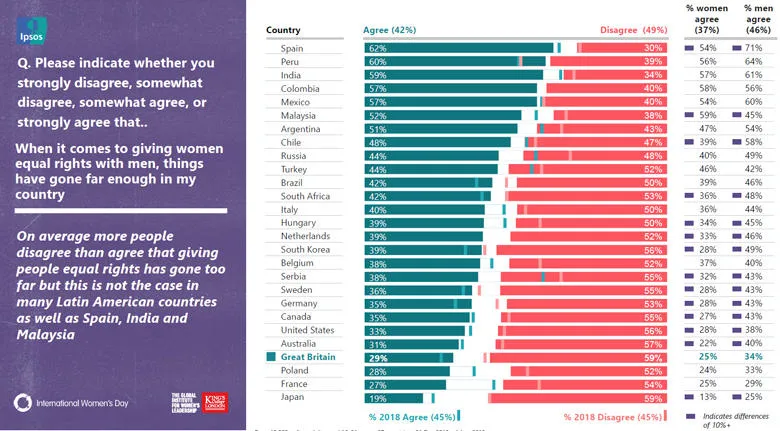
People still think it is easier to be a man than a woman in today’s society
Globally, half (52%) believe there are more advantages to being a man than a woman in society today.
Just over one in ten (12%) believe that being a woman is more advantageous than being a man whereas a quarter (26%) believe there are no differences between men and women.
Men are more likely than women to say there is no difference (30% compared to 22%).

Attitudes towards masculinity are changing
Childcare is no longer seen as a woman’s job, and the majority say they would be comfortable with a female boss.
Three-quarters globally (75%) disagree that a man who stays at home to look after his children is less of a man, compared with just one in five (18%) agreeing.
Agreement rises to 76% in South Korea and to 39% in India. Those most likely to disagree with this statement are Serbia (92%), the Netherlands (90%) and Colombia (87%).
In Great Britain, only 13% agree that a man staying at home to look after his children is less of a man, while the vast majority (81%) disagree.
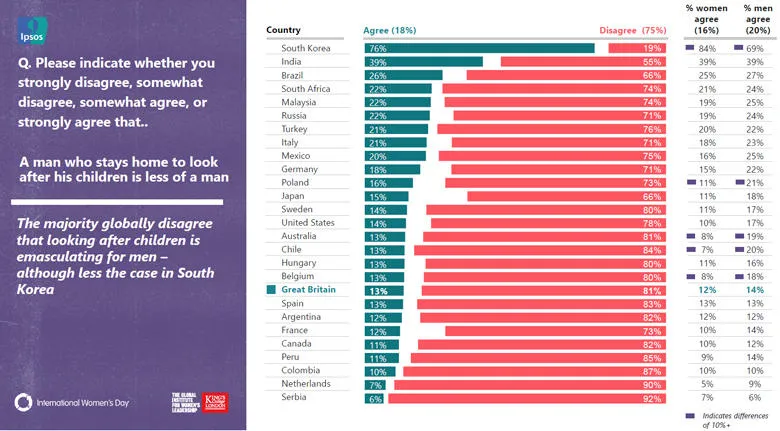
The top issues facing women
Sexual harassment, sexual violence, physical violence, equal pay and domestic abuse are still seen as the top issues facing women across the globe.
Three in 10 people globally (30%) pick out sexual harassment as the top issue facing women.
Respondents in Peru (54%), Turkey (51%), Argentina (45%), Malaysia (40%) and Mexico (40%) are significantly more likely to see sexual harassment as the top issue facing women than average.
Sexual violence is seen as the top issue in Colombia (45%), Spain (44%) and South Africa (41%), while the top issue for Peru is physical violence (55%). Concerns over women’s safety dominate yet we know from
Respondents in Serbia (41%), Australia (40%), Poland (24%) and Russia (21%) see domestic abuse as the top issue, while people in South Korea (31%) and Japan (26%) feel that balancing work and caring responsibilities is the top issue that women are facing in the country.
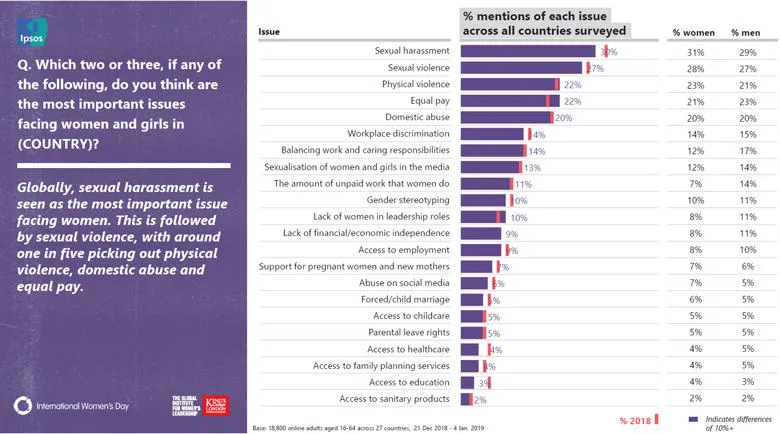
The impact of the #metoo movement
Close to two in five in both Great Britain (38%) and the US (37%) think that the movement has made a positive impact on society.
But there is a much bigger difference between Brits and Americans over the negative impact of the movement. Three in 10 people in the US (31%) believe that the movement has had a negative impact on society, compared with almost half this proportion (16%) in Britain.
In the US, 64% of Democratic supporters think the movement has had a positive impact, compared with just 25% of Republican supporters.
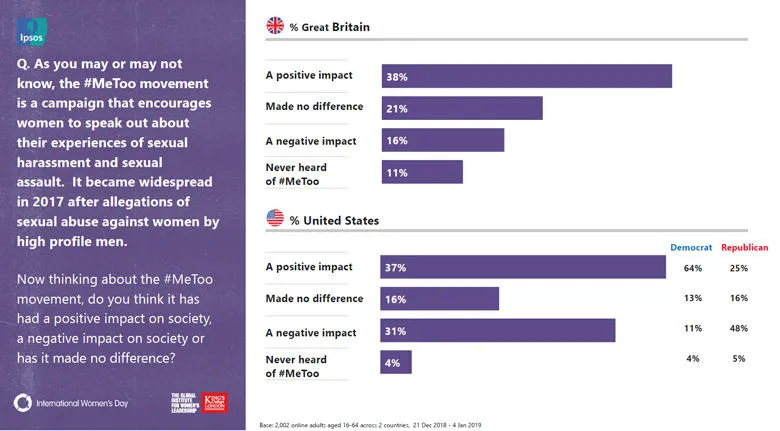
The term "feminist" continues to divide
Fewer people across the world now say they would describe themselves as a feminist, falling from 37% in 2018 to 33% in 2019, suggesting the term may carry fairly negative connotations for some.
Women are more likely to identify as a feminist than men (38% vs 28%).
Those most likely to identify as feminists are in India (50%), South Africa (44%) and Spain (44%). Those least likely to do so are in Japan (18%), Hungary (20%), and Russia (20%).
In Great Britain, 35% say that they define themselves as a feminist, similar to findings from last year (37%) and British women are much more likely to say this than British men (41% vs 29%).
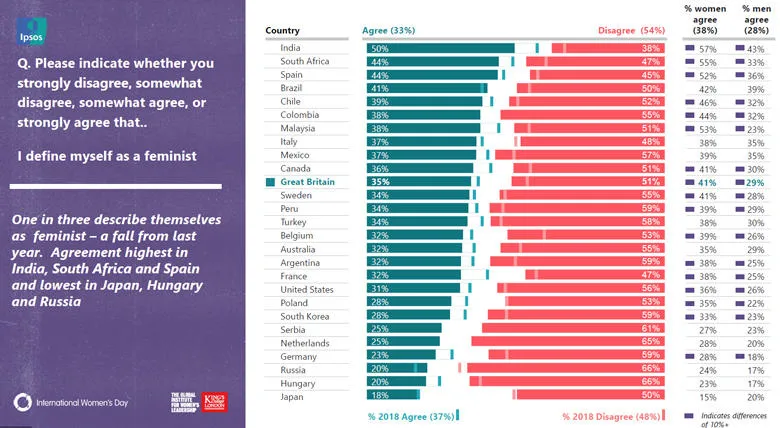
Kelly Beaver, Managing Director of Ipsos MORI’s Social Research Institute said:
"The study shows there is still a long road ahead to achieving gender equality globally. What’s more, we know from previous work that people underestimate the scale of the task in hand. However, the survey does offer some green shoots of optimism; it is clear that attitudes towards masculinity and gender roles are changing, with childcare no longer being seen as the preserve of women. And people are optimistic that discrimination in some aspects of life – such as education will end in the next couple of decades. However, in order to progress in many other spheres a number of fundamentals need to change – from ensuring women are safe from violence and harassment and that women and men have equal pay at work. And the findings highlight that none of this can be achieved without the support of men. Men are integral if we are to achieve balance for better."
Julia Gillard, former Prime Minister of Australia and Chair the Global Institute of Women’s Leadership at King’s College London, said:
"The study shows that around the world people rightly believe gender equality has not gone far enough. While the issues we prioritise may be different country by country, there is a real consensus that men must play their part if we are to achieve true parity between the sexes.
“It is also heartening to see that attitudes towards male and female roles are changing. Politicians and business leaders must hear and act on that message. We need to redouble efforts to accelerate progress in tackling gender gaps and increasing female representation in positions of power.”
Glenda Slingsby, International Women’s Day, said:
"A balanced world is a better world. The findings of the study highlight that everyone can play a role in forging gender parity. Gender balance is not a women's issue, it's an economic issue – so advocacy, inclusive mindsets and tangible action are needed from all. In many respects, the study indicates that we've moved on from women having to succeed in a man's world. Stereotypes are being challenged and more diverse representation of women is evident. Clearly, however, there is still a continuing need worldwide for more progressive mindsets and inclusive behaviours to be forged. Hopefully, through studies such as this and campaign themes with a strong call-to-action and widespread appeal – like our International Women's Day 2019 #BalanceforBetter theme – collectively everyone everywhere can strive for women's equality and continue to make positive gains."
